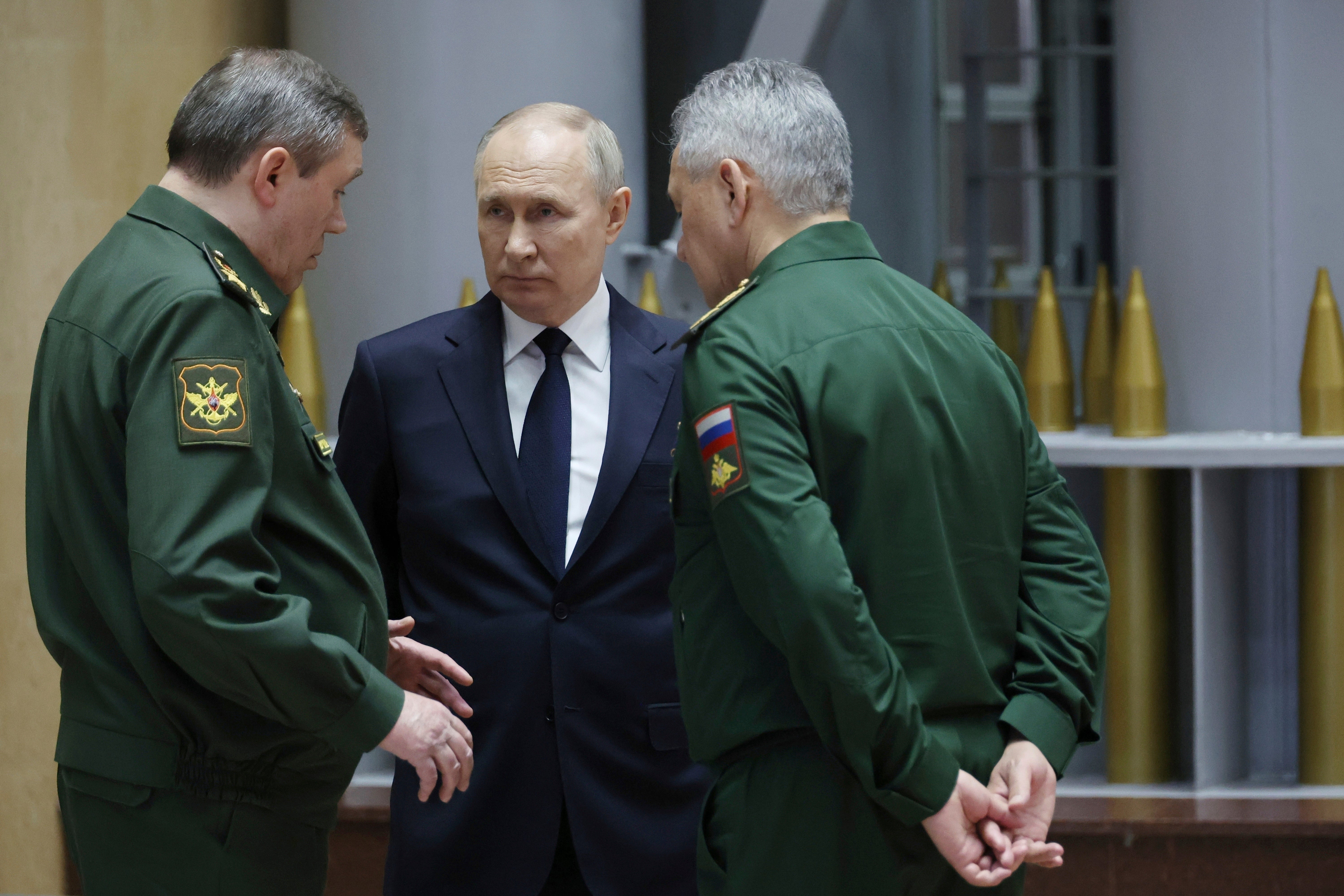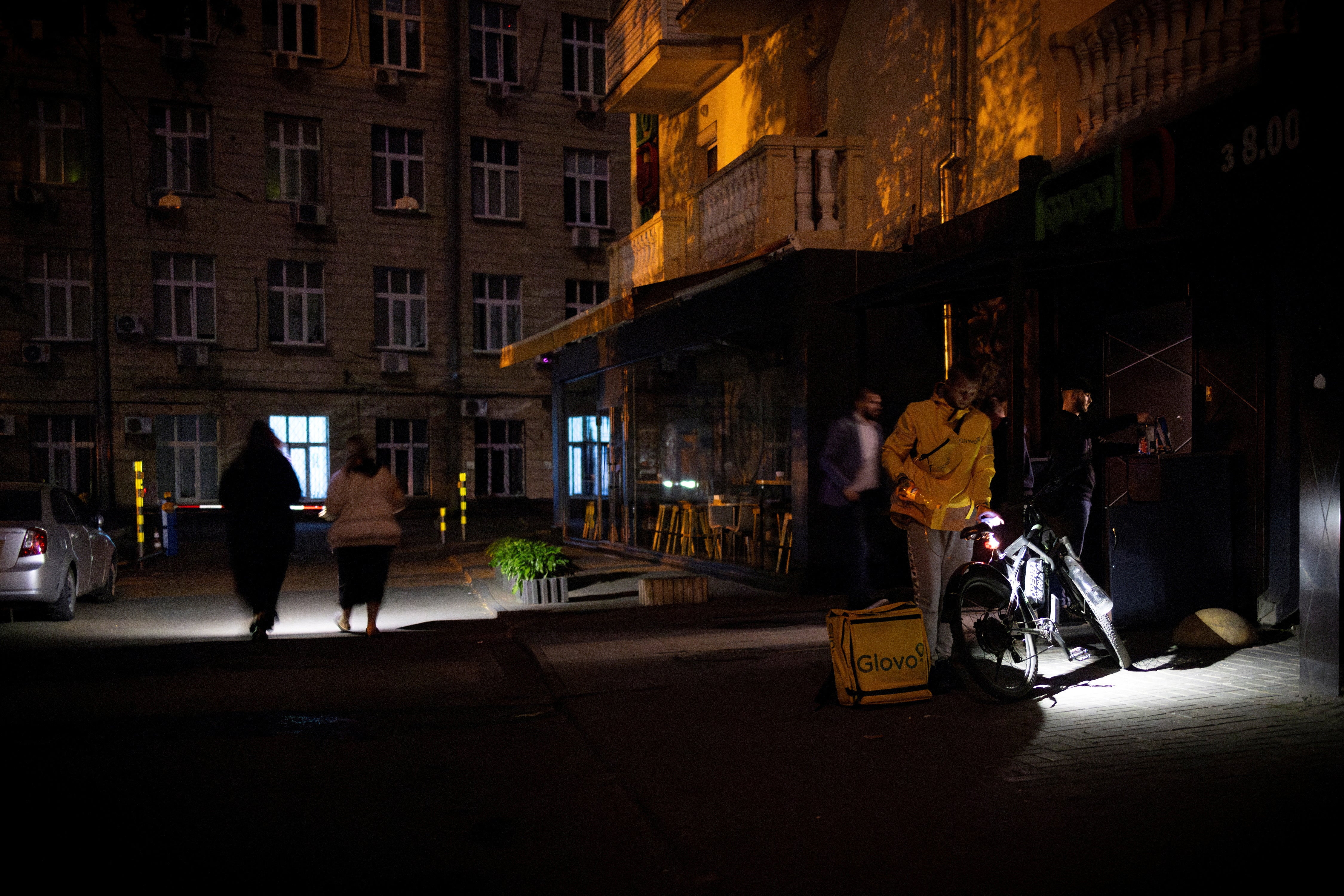Ukraine war: Top international court issues arrest warrants for senior Russian officials over alleged war crimes

The International Criminal Court (ICC) has issued arrest warrants for two senior Russian officials, accusing them of overseeing war crimes against civilians during Moscow’s invasion of Ukraine.
Former Russian defence minister Sergei Shoigu, a close ally of Vladimir Putin, and military chief Valery Gerasimov have been accused of “directing attacks at civilian objects”, “causing excessive incidental harm to civilians or damage to civilian objects” and perpetrating the crime against humanity of inhumane acts”.
The statement from the ICC added that there are “reasonable grounds to believe that the two suspects bear responsibility for missile strikes carried out by the Russian armed forces against the Ukrainian electric infrastructure from at least 10 October 2022 until at least 9 March 2023”.
They added that they believe that where strike targets may have qualified as military objectives at the time, the “expected incidental civilian harm and damage would have been clearly excessive to the anticipated military advantage”.
The warrants come as Russia has again stepped up its long-range assault on Ukraine’s energy infrastructure in recent months, launching at least eight large-scale aerial assaults in recent weeks. Moscow launched dozens of drones and missiles during the latest attack, injuring multiple civilian workers and causing yet more blackouts across the country.
Ukrainian president Volodymyr Zelensky recently said Moscow had destroyed half of his country’s electricity-generating capacity since it began pummelling its energy facilities in late March. Mr Zelensky has repeatedly called on Ukraine’s allies to send more air defence systems. He has specifically requested seven sophisticated air defence systems called Patriots from the US.

Every winter during Russia’s more than two-year invasion of Ukraine, Moscow has conducted airstrikes against Ukraine’s energy grid, which it claims is a a legitimate military target. The missile and drone attacks on power plants and other infrastructure have killed hundreds of civilians, Ukrainian officials have said, and left millions with no electricity or water for long periods. ICC Chief Prosecutor Karim Khan visited Ukraine in March last year to investigate Russia’s aerial campaign The Kremlin maintains that it does not target civilians.
Mr Zelensky’s top advisor, Andriy Yermak, labelled the move by the ICC as an “important decision”, adding that it was clear Shoigu and Gerasimov “bear individual responsibility”.
“Everyone will be [held] responsible for evil,” he wrote on the Telegram messenger app.
The country’s human rights ombudsman Dmytro Lubinets said the ICC decision meant Ukraine was a step closer to getting justice.
“Sooner or later, a just punishment will overtake every war criminal!” he said in a statement posted on his Telegram.
There is no immediate likelihood of either suspect being detained. Russia is not a member of the global court, does not recognise its jurisdiction and refuses to hand over suspects.
At least six Russian officials have now been handed arrest warrants since the full-scale invasion of Ukraine.
In March last year, arrest warrants were issued for Putin and his children’s commission Maria Lvova-Belova for their role in the alleged forcible deportation of Ukrainian children.

In March 2024, the ICC issued arrest warrants for top Russian commanders Sergei Kobylash and Viktor Sokolov for suspected war crimes in Ukraine, again related to “missile strikes carried out by the forces under their command against the Ukrainian electric infrastructure from at least 10 October 2022 until at least 9 March 2023”
The latest round of arrest warrants deals a blow to some of Russia’s most senior officials, both of whom have been heavily involved in Putin’s invasion of Ukraine. Russia has denied committing war crimes in Ukraine and has accused the ICC of unfairly targeting Russian officials.
Shoigu served as Putin’s defence minister from 2012 until earlier this year, before he was appointed the head of the Russian Security Council, a top role in the Kremlin handling the country’s domestic and international security.
He was an instrumental figure in overseeing Putin’s invasion of Ukraine. Last year, he visited North Korea ahead of Putin’s meeting with the nation’s dictator Kim Jong-un, in what experts said paved the way for an eventual military deal that saw Moscow receive lethal weapons from Pyongyang that they allegedly later used against Ukraine.
Gerasimov, who was appointed last year as the operational commander of the “special military operation” in Ukraine, a propagandistic phrase the Kremlin uses to describe its invasion of its neighbour, has directly overseen the war since its beginning. He is both the chief of the general staff and the deputy defence minister.
The Geneva conventions and additional protocols shaped by international courts say that parties involved in a military conflict must distinguish between “civilian objects and military objectives” and that attacks on civilian objects are forbidden.
The arrest warrants bar Shoigu and Gerasimov from being able to visit any of the 124 signatories to the ICC, as those countries will be obliged to arrest the two officials once they arrive.
It comes as Ukraine is set to officially launch membership talks with the European Union in what President Zelensky has described as a dream come true for his country’s citizens. Deputy prime minister for European and Euro-Atlantic integration Olga Stefanishyna will lead Ukraine’s delegation at an intergovernmental conference in Luxembourg on Tuesday, marking the official opening of talks to align the countries’ laws and standards with those of the 27-nation bloc.
A few hours later, Moldova, which applied to join the EU after Russia’s invasion of Ukraine in February 2022 and was granted candidate status four months later, will take part in a separate intergovernmental conference to officially launch its own accession process.
Nevertheless, starting the talks process is sending another strong signal of solidarity with Ukraine beyond the billions in financial support the EU has provided. It is also a show of support for Moldova, which has faced its own challenges with Russia.
“Generations of our people are realising their European dream. Ukraine is returning to Europe,” Mr Zelensky said in an online post after EU member states agreed on Friday to open the talks.
The negotiations will likely begin in a few months and the membership process will take years. Ukraine wants to join by 2030, but it must notably carry out dozens of institutional and legal reforms first. That daunting list is led by steps to combat corruption, and includes broad reforms to public administration and judiciary.
When it comes to the battlefield, Mr Zelensky has fired the military commander leading the charge of Kyiv’s troops in eastern Ukraine after the general was accused of “killing more Ukrainian soldiers than any Russian general”.
In his nightly video message, Mr Zelensky announced that Lt Gen Yuriy Sodol had been replaced by Brig Gen Andriy Hnatov. The move came a day after Bohdan Krotevych, the leader of Ukraine’s Azov regiment, accused the general of causing significant military setbacks and major losses in personnel.
Without mentioning Sodol by name, Mr Krotevych wrote: “All the military now understand what kind of person I’m talking about, because 99 per cent of the military hate him for what he does.”





